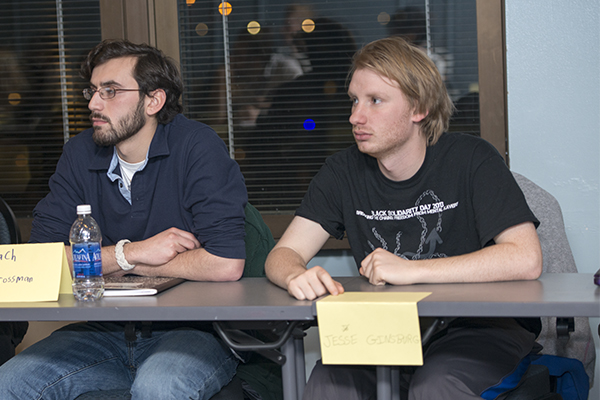

Student senators have begun the semester by discussing desired changes they want to make to several academic policies.
Senator Zach Grossman, a student representative on the Academic Affairs Committee, said the committee plans to make changes to Student Evaluations of Instructors (SEI). Senators Nadia Alirahi and Jesse Ginsburg are working with the Liberal Education Committee to make changes to General Education (GE) and Graduation requirements.
Alirahi and Ginsburg said the goal of the Liberal Education Committee is to reduce the amount of GEs students are required to take before graduating. The committee is focused on helping undergraduate students become more well-rounded.
“There are going to be a lot fewer GEs,” Ginsburg said. “You will also have more choices in the selection of classes you need to use as your GE requirements.”
Alirahi said the committee wants to eliminate Composition I and II, and instead offer one Composition course and a pre-Composition course for students not prepared to meet the demands of the Composition class.
Students will no longer be able to place out of math or foreign language classes. Alirahi said the only way to get out of either is to have received credits from a college course before enrollment or to have gotten credit out of high school AP and IB courses.
She also said that certain GE requirements will become optional. From a pool of six GE requirements, students will be allowed to choose three of the six requirements to fill.
Both Alirahi and Ginsburg said the committee plans to introduce more graduation requirements for undergraduates. They said the committee plans to introduce an interdisciplinary first-year seminar after the composition class. They will also require students to take at least one STEM (Science, Technology, Engineering, Math) class, along with a capstone course once they are close to finishing their undergraduate degree.
Assistant Professor of Chemistry and Liberal Education Committee member Megan Ferguson said the goal of the new GE and graduation requirements are consistent with SUNY New Paltz’s goal for education in the future.
“Today’s environment is so fast and it changes so quickly that students need to be prepared and able to tackle problems you didn’t necessarily learn in school,” Ferguson said. “We’re trying to enhance problem-solving and quantitative skills by teaching from a variety of perspectives. With the multi-interdisciplinary discourse offered early in your college career, we want to have it so students will be able to use what they learn in the upper division courses later in their career.”
Grossman said the Academic Affairs Committee wants to make SEIs more transparent. Grossman said he wants the SEIs to be more constructive than other avenues students use to learn about potential professors.
“Right now, the only way to reach a consensus about a professor is through either word of mouth or Ratemyprofessor.com,” Grossman said. “We want to get the most out of the comments for both professors and students.”
The committee also hopes to make it so professors can choose to not give their SEIs to their respective deans should they find the SEI offensive and if the student agrees on their SEI of a professor to not have the comments released to the dean, Grossman said.
He said the goal of this is to lessen the unconstructive criticism students may feel comfortable giving to their professors because of the current anonymity of the SEIs.
“Pretty much all of the professors on the committee said they’ve received personal attacks on their SEIs in the past,” Grossman said. “None of us on the committee think it’s fair. From a student and faculty perspective, we want to make it so that it’s as extremely constructive as possible…If a dean notices a professor continuously neglects to hand in their SEIs, they can intervene.”
The committee wants to put emphasis on the written portion of the SEI and shift away from the number ranking students can give. Grossman said he and the committee hope the comments can help build a more productive relationship between professors and deans, so that the education experience benefits students and faculty.
“We want to have fairness on all sides,” Grossman said.”Neither too pro-student, too pro-professor…we as students need to be constructive and remember out professors are people too. It’s not right to hide behind a screen. They take it personally, and it can hurt.”
